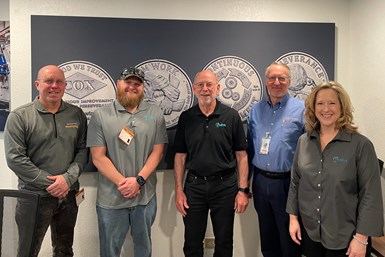The Importance of All of Us Getting Out
Go visit other machine shops when possible. Go to industry events. Go where you can network with others who might share the same challenges, pain points and successes as you.

(Left to right): Derek Korn, David Wynn, Steve Sorenson, Bill Cox and Cate Kurela Smith during a visit to Cox Manufacturing in San Antonio, Texas. (Photo credit: PM)
Travel is an important part of my job as writer and editor-in-chief of Production Machining. But it can be equally as valuable to you in terms of (pardon the cliché) working on your business rather than in your business. Here are examples of both scenarios.
A couple months ago, I wrapped up a weeklong trip to Texas where I tried to make the most of my time away from the office. All told, I visited three machine shops about which I’ll create articles for Production Machining and attended the Precision Machined Products Association’s Management Update meeting. Heck, I even saw The Alamo for the first time.
My first stop was near San Antonio to see Todd Boley at PDS + CNC Machining Inc. to learn about the shop’s move from prototyping to production in part leveraging a multitasking twin turret/twin spindle machine — its first — from Spinner North America. I say “in part” because there’s a lot more to it than that. It’s important to consider how key production information flows through your shop while standardizing processes.
The second stop was at nearby Cox Manufacturing where Bill Cox gave me, Steve Sorenson from California’s Sorenson Engineering, and Cate Kurela Smith and David Wynn from the PMPA, a tour of the company’s expansive and impressive operation. (Sorenson currently is PMPA’s president). This will result in a story about Cox’s in-house shop management software it has been refining for many years. But we also learned more about Sorenson Engineering’s approach to vertical integration, bringing multiple non-machining processes in-house. As Sorenson stated, the goal is for “nobody else to touch our parts” besides the customer after delivery. (His is another large shop I want to visit.) Two principals from another shop who were considering joining the PMPA joined us on this visit and commented on how much they valued being able to interact with other shop owners/managers given their company was in a remote area of the country.
Then, I drove to Austin to visit Wolfram Manufacturing Technologies with an eye toward writing an article about how it benefits from its home-grown shop production software called OnTakt. This was developed for the shop’s own use, but it now offers it to others. In short, the story will suggest ways to leverage machine data to effectively reduce machine downtime. (Think about tying data to dollars.)
After that, I attended the PMPA’s two-day Management Update meeting along with 146 PMPA members from 77 companies. Lisa Ryan, founder and chief appreciation strategist of Grategy, kicked off the event with a great hour and a half or so talk about company culture. This is an obscenely brief description of her talk, but, in essence, the key is to remember that while it’s everyone’s responsibility to help establish a healthy company culture, it starts at the top. Also, have you ever considered “stay interviews?” Frequent walks around your shop to remain connected to employees? How little notes/gestures can go a long way to helping employees realize how valued/appreciated they are?
Of course, this event featured a number of other helpful presentations as well as various breakout and roundtable sessions and networking opportunities. I always come away with helpful insights from this and other association events, and it’s always great to reconnect with my friends in the PMPA community and meet new members. I can sense others feel the same way as I’m watching and sometimes being part of their conversations.
Anyway, now, it appears that I have some writing to do. But when do I ever not?
Read Next
Seeing Automated Workpiece Measurement in Real Time
User-friendly inspection software for CNC machining centers was shown at IMTS 2024 monitoring measurements between and after machining while performing SPC based on recorded measurement values.
Read More5 Aspects of PMTS I Appreciate
The three-day edition of the 2025 Precision Machining Technology Show kicks off at the start of April. I’ll be there, and here are some reasons why.
Read MoreDo You Have Single Points of Failure?
Plans need to be in place before a catastrophic event occurs.
Read More










.jpg;maxWidth=300;quality=90)







